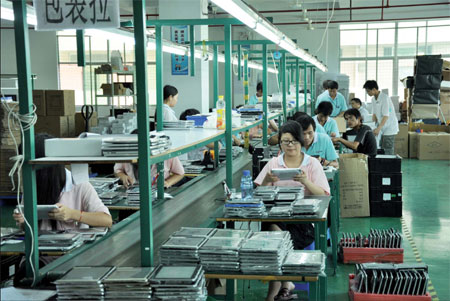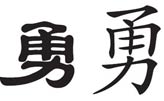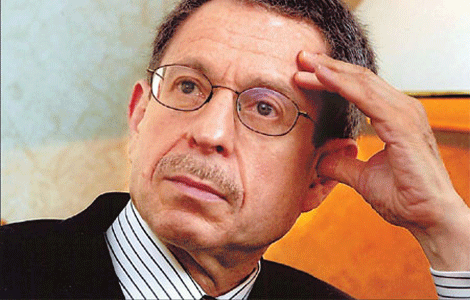The rise of the no names
Updated: 2011-09-02 10:40
By Zhao Yanrong (China Daily)
|
|||||||||
|
|
Shenzhen's makers of 'white-box' tablet PCs are giving Apple a run for its money
When Steve Jobs resigned on Aug 25 as CEO of Apple Inc, many of his worshippers in China thanked him for the changes he brought to the tech world and to people's livelihoods. One special group was the small manufacturers and vendors of tablet PCs in Shenzhen, the electronics center in China, whose businesses were saved by Apple's iPads. Shenzhen has has been leading the export market since December 2009 when manufacturers there started producing tablet PCs.
Before entering the tablet PC industry, Shenzhen Easydy Electronic Technology Co Ltd made netbooks, an Internet-ready device that had fewer complex functions, five years ago, when the high-tech industry in Shenzhen believed the small and light mobile devices would replace laptop computers.
| |||
But all that changed when the iPad was launched in April 2010. Companies in Shenzhen started immediately making and shipping copycat tablet PCs overseas.
"Even though the iPad dominates the tablet PC market, I am sure 99 percent of the digital companies in Shenzhen appreciate Jobs, who has set up a model as well as created a huge market demand for us," says Wen Feng, general manager of Easydy. "Many companies were struggling or even bankrupt until the iPad was launched in early 2010."
But in light of the recent news that cables obtained by WikiLeaks showed Apple was concerned about counterfeiting in China and set up a security team to tackle the issue, most manufacturers in Shenzhen are under fire from the high tech-industry.
Many Shenzhen manufacturers say they are just making tablet PCs, not fake Apple products. They say their products use Google's Android software and do not carry an established company's logos.
For these manufacturers in Shenzhen, tablet PCs are made up of no more than a shell, a PC motherboard, a screen and a battery, which is easier than making any other digital products.
"Just one month after the iPad was first launched, 60 percent of China's netbook manufacturers and many of its portable media player suppliers started rolling out tablet PCs as cost-effective alternatives," says Livia Yip, publisher of a report on the tablet PC industry.
Companies with these manufacturing backgrounds can hit the ground running with their existing infrastructure of research and development, production and familiarity with consumer electronics, she says. What they are making are called white-box tablet PCs because they are essentially computers without a registered brand name.
Shipments of white-box tablet PCs grew more than 230 percent from 567,000 units in the last quarter of 2010 to 1.9 million units in the first quarter this year, says a DisplaySearch Quarterly Mobile PC Shipment and Forecast Report in June. China represented the largest market for white-box tablet PCs, accounting for 44 percent of global shipments.
The market for iPads in China dropped 5.14 percent in the second quarter of this year, according to Analysys International, an Internet information company.
"If 2010 is the first year of the tablet-PC era, 2011 must be the start of Chinese white-box tablets," says Liu Muhe, CEO of 1pad.cn, a Shenzhen-based website that covers the tablet-PC industry.
In these white-box tablet PCs, the no-name computers mostly use Google's Android 2.2 or 2.3, which was originally designed for smart phones. Many major tablet brands use the updated Android 3.0.
The white-box tablet PC screen resolution is far worse than that of leading products. Almost all of the cheaper tablet PCs use older screen technology in order to cut down on costs.
"For many domestic consumers, such as students and young migrant workers, they may not be able to afford major brands like an iPad, but they still have a strong desire for new fashionable devices. A lower price is the key feature to catch their attention," says Li Feng, marketing director of Yuandao Digital, a tablet PC company that focuses on the domestic market.
Li said that white-box tablet PCs have one key advantage: fees.
"Many Chinese users are not willing to pay fees for applications, which iPad often charge for downloads, but our tablets are compatible with many free software, games and applications," he said.
From November to July, Yuandao launched eight different models of tablet PCs priced from 199 yuan (21 euros) to 1,999 yuan. Before the new school season in September, Yuandao launched a number of promotional events in its direct-sale stores. Yuandao sold more than 100,000 units in March.
"The tablet PC market is still attractive for many digital companies, even if there are hundreds of them already," Liu said.
Despite heightened alerts on intellectual property infringements by the Shenzhen government during the recent Universiade 2011 Shenzhen, many local companies are busy with orders for the overseas holiday season and the new school season in September.
"Foreigners in Shenzhen still get surprised by the low-price tablet PCs this summer," says 1pad's Liu, who started the website in October of last year.
"The tablets, which cost less than $250, are everywhere in the market. They are even cheaper than (if you took) the current most popular product, the iPad2, and slashed the price in half," he says.
Easydy is one of hundreds of tablet PC companies in Shenzhen. The orders they received from overseas in August broke 15,000, about 10 times the amount of orders 18 months ago.
"Many holiday seasons take place in the second half of the year, for Thanksgiving, Christmas and New Year's. The market for holiday gifts provides a big opportunity for our products," says Wen Feng, the general manager from Easydy.
He said most international orders are from the Middle East and Africa, areas that have less-developed digital markets and whose consumers have weaker purchasing powers than Western customers.
"Our products are not capable of competing with the major international tablet PC brands in Western countries, but they are really popular in those areas for the low price," Wen says. International wholesalers pay Wen no higher than $150 for each product.
Most tablet PCs shipped overseas from Shenzhen can carry out about 80 percent of the functions that an iPad can and more. In fact, most tablet PCs made in China can provide more functions than tablet PCs from major brands.














